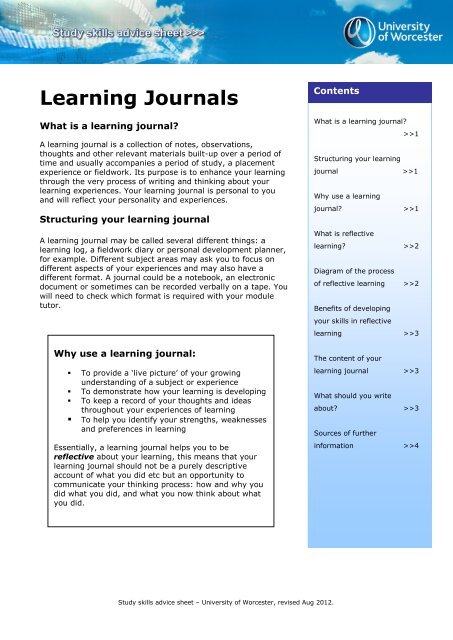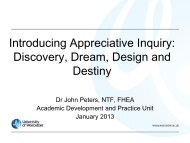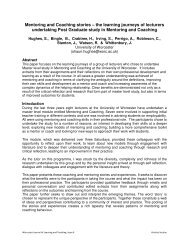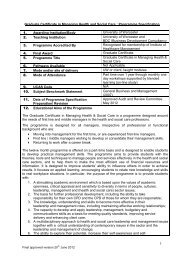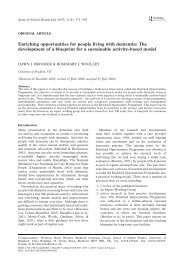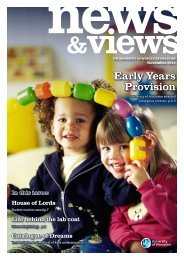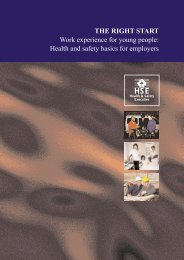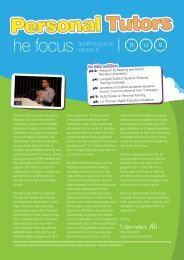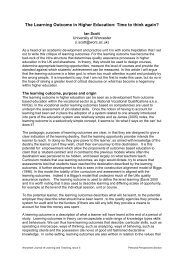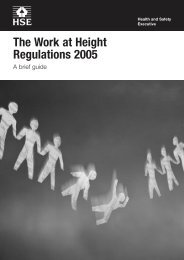Learning Journals - University of Worcester
Learning Journals - University of Worcester
Learning Journals - University of Worcester
You also want an ePaper? Increase the reach of your titles
YUMPU automatically turns print PDFs into web optimized ePapers that Google loves.
The benefits <strong>of</strong> developing your skills in reflective learningReflective learners are more likely to develop a deeper understanding <strong>of</strong> theirsubject and to achieve higher grades as a result. Reflective learners tend to:• Be motivated, know what they are trying to achieve and why• Be pro-active in extending their understanding <strong>of</strong> new topics and subjects• Use their existing knowledge to help them to develop their understanding<strong>of</strong> new ideas• Understand new concepts by relating them to their previous experiences• Understand that additional research and reading widely will improve theirunderstanding• Develop their learning and thinking by building on the critical evaluation<strong>of</strong> their previous learning experiences• Be self-aware, able to identify, explain and address their own strengthsand weaknessesContent <strong>of</strong> your learning journalA learning journal should focus on your own personal responses, reactions andreflections to new ideas or new ways <strong>of</strong> thinking about a subject that have beenintroduced to you through:• Lectures, seminars and workshops• Research and reading including any visual research: e.g. television, filmetc• Conversations and discussions with other students or tutors• Significant experiences that have happened in the work place, onplacements or field tripsWhat should you write about?The most important thing is to make time for your writing – regularly set asidesome time to think, and then write down your thoughts. Try to focus on using thejournal to help you to communicate:• What you think about issues raised on your course/ placement etc• Any flashes <strong>of</strong> inspiration you have had• What you understand so far• What you find puzzling, difficult or contradictory• How you can reach a better understanding <strong>of</strong> the above• What do you need to know more about, and how can you go aboutfinding out more?• What resources have helped you to understand and/or been interestingto use?• How do you feel about the way you have approached the issue/topic s<strong>of</strong>ar?• What new knowledge, skills or understanding have you gained during theprocess <strong>of</strong> writing your learning journal?Study skills advice sheet – <strong>University</strong> <strong>of</strong> <strong>Worcester</strong>, revised Aug 2012.
Further informationThis Study Advice Sheet has beenproduced by Student Services atUW.We support student learning acrossthe <strong>University</strong> through thepublication <strong>of</strong> materials such asthese.Other study advice sheets that youmay find useful include:Essay writing<strong>Learning</strong> at universityMaking oral presentationsMinimising stressOrganising yourselfPlagiarism & referencingReading efficientlyRevision and exam skillsStudy at a distanceTaking notesUsing feedback to improve yourworkWhat does the question mean?Working in groupsWriting reportsAll study advice sheets are availableto view and download on thefollowing website:www.worcester.ac.uk/studyskillsor you can follow the links fromyour SOLE page.You may also find it useful to checkout the ‘Moving On’ pack,accessible from the link on yourSOLE page.‘Moving On’ is a study skillspackage specifically designed tohelp you prepare for HigherEducation & to become a successfulstudent.Contact: studyskills@worc.ac.ukFinally, writing a learning journal gives you the opportunityto consider the following issues regarding your long-termdevelopment:• Have you changed your opinions or values during theprocess/experience?• How can you improve your learning, thinking andworking in the future?• Have you identified the next step(s) for your furtherdevelopment?Sources <strong>of</strong> further information• The following titles are available in the Peirson Libraryto help you find out more about learning journals:Ghaye, T. & Lillyman, S., 1997. <strong>Learning</strong> journals andcritical incidents: reflective practice for health carepr<strong>of</strong>essional. Dinton: Quay.Moon, Jennifer., 1999. <strong>Learning</strong> <strong>Journals</strong>: a handbookfor academics, students and pr<strong>of</strong>essionaldevelopment. London: Kogan Page.More generic guidance on reflection and criticalthinking is available in the three titles by StellaCottrell (all available in the Peirson Library):oooCritical thinking skillsSkills for successStudy skills handbook• You can also search for ‘reflective learning’ in thekeyword search on the library catalogue for additionalrelevant titles.• Talk to your module tutor for further advice aboutany specific requirements for your course• There may be relevant guidance in your studenthandbook, depending on your subject area.• The Student Qualities Pr<strong>of</strong>ile provides a frameworkfor you to record your self-evaluation, reflection,skills development, action planning, target settingand achievements through all your learning at<strong>Worcester</strong>.Study skills advice sheet – <strong>University</strong> <strong>of</strong> <strong>Worcester</strong>, revised Aug 2012.


